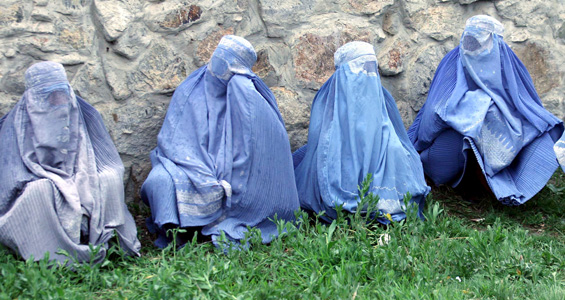Afghan women writing for change
A unique project helps Afghan women writers find their voices amid instability.

 |
| The Afghan Women’s Writing Project hopes to give women a voice amid an uncertain future [EPA] |
“The man sitting in front of me was my country’s president, but the only thing I could feel towards him was anger,” writes Meena, describing a meeting with Hamid Karzai, the Afghan president.
“I lost respect for him because of his policies towards women’s rights, his stance on negotiating with the Taliban, and his alliance with Dostum, a warlord and criminal.”
In a country where women’s voices are rarely heard, Meena’s publications on a pioneering blog, the Afghan Women’s Writing Project (AWWP), represent a tentative step forward in addressing the lack of female voices in the public sphere in Afghanistan.
Meena and her fellow contributors take enormous risks in writing – publishing anonymously to avoid being identified.
Many of their own families do not know what they are doing, and if found, they could face serious reprisals from those who believe that Afghan women should be neither seen nor heard.
One contributor, Roya, explains the constraints under which she works. “No one knows I am writing for this project and it stays a secret,” she says. “I can’t tell my family I am writing. There are security risks for us.”
Worth the risk
In the volatile political and security climate of Afghanistan, no-one is taking any chances.
“Recently I received a death threat from Taliban,” one anonymous poster writes, in a piece entitled Being a Woman: My Only Sin.
But for the contributors, having their voices heard is worth the risk.
“I grew up being told by the society that I was mentally unequal to men and incapable of doing anything but giving birth and raising children,” Meena says. “Writing for the blog has enabled me to take the tears, the pain and the horror of Afghan women to my Afghan brothers and to the world.“
The project was set up by American novelist Masha Hamilton as a way for Afghan women to share their experiences directly with the rest of the world, rather than being spoken for by men.
|
“There are many cases of women feeling that this is a lifeline for them” Masha Hamilton, the founder of the Afghan Women’s Writing Project |
“It’s about developing their voices,” Hamilton says. “We don’t just put anything up. It’s a dialogue and a communication. We want to help them express their stories, and their writing often becomes more personal as time goes on.”
The project has been an enormous success. It attracts submissions on topics ranging from contemporary politics to considerations of the burqa, offering a unique insight into a world ordinarily kept hidden from public gaze.
A network of volunteer teachers in the US use secure online classrooms to set writing prompts for the 36 women who participate from across Afghanistan.
“We have some women writing from the most conservative provinces of Afghanistan,” Hamilton says. “There are many cases of women feeling that this is a lifeline for them.”
Catalyst for change
As well as giving English language readers a chance to understand more about the lives of Afghan women, the project also represents an educational opportunity for the women who take part.
For some, it is the only opportunity they have to practice their English, although organisers say that the development of creative skills is prioritised over improving the technical aspects of their language.
Either way, the women clearly enjoy the interactive nature of the project.
Elay has been taking part for the past two months. “I have wonderful teachers,” she says.
“They correct my essays and I learn from my mistakes, and the way they explain the mistakes.”
But with Afghanistan rocked by spreading instability and large swathes of the country falling under Taliban control, the writers are well aware that the relative freedom that allows them to take part in the project is not guaranteed to last.
Hamilton says that the deteriorating security situation has had an impact on the way the women see their futures.
“In 2004, I went to Afghanistan for the first time,” she says. “I could see that there was a long way for women to go, but there was hope. When I went back in November 2008, a lot of that had gone.”
The prospect of the government cutting a deal with the Taliban is of particular concern and the organisers are making contingency plans in case conservative elements are politically empowered by any potential deal.
“We want to get them all laptops, in case things get worse again,” Hamilton says. “Then they could write at home.”
Meanwhile, the women who risk everything to make their voices heard hope their writing can be a catalyst for positive change.
“I believe words are stronger than guns,” Meena says. “It is words that start revolutions and changes.”
To read the work of the Afghan Women’s Writing Project, visit http://awwproject.wordpress.com/
Al Jazeera is not responsible of the content of external websites.